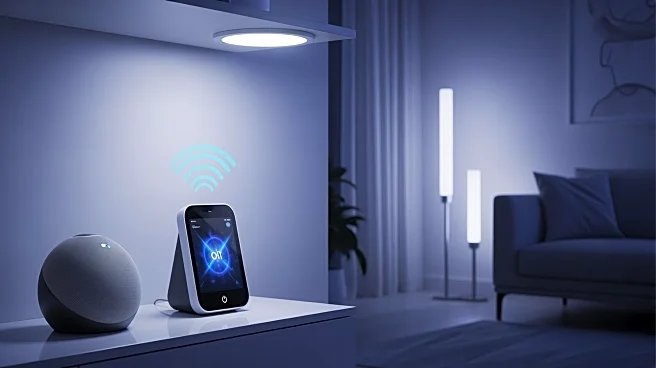What's Happening?
AI-powered smart homes are revolutionizing daily life by automating routine tasks, optimizing energy consumption, and enhancing convenience through personalized experiences. AI-driven systems learn from
residents' habits to adjust settings automatically, such as preheating ovens or adjusting lighting based on occupancy patterns. Smart devices like voice-controlled speakers, smart thermostats, and AI-powered lighting systems offer hands-free control, accessibility, and energy savings. The integration of AI in smart homes promises an automated and interconnected future where devices work together to anticipate needs and enrich daily living.
Why It's Important?
The integration of AI in smart homes is significant as it enhances energy efficiency, reduces utility costs, and increases property value. Homeowners benefit from lower energy bills and improved security through AI-enabled systems. The technology also supports sustainable living by optimizing energy use and integrating with renewable energy sources. As AI technology advances, smart homes will become more intuitive, offering greater convenience and comfort. This shift is crucial for the real estate market, as properties with AI features are increasingly in demand, attracting tech-savvy buyers and commanding higher prices.
What's Next?
The future of AI in smart homes includes further advancements in automation and personalization. Builders and developers are expected to invest more in AI technology to meet the growing demand for smart homes. The market is projected to expand significantly, with more homes integrating AI systems for enhanced living experiences. As AI technology evolves, it will likely lead to more sophisticated home management systems that can predict and respond to residents' needs more accurately. This trend will continue to shape the real estate industry and influence homebuyer preferences.
Beyond the Headlines
The ethical implications of AI in smart homes, such as privacy concerns and data security, are important considerations. As AI systems collect and analyze data to optimize home environments, ensuring the protection of personal information is crucial. Additionally, the potential for AI bias and discrimination in smart home systems must be addressed by manufacturers. The long-term impact of AI on lifestyle and societal norms will continue to evolve as technology becomes more integrated into daily life.









